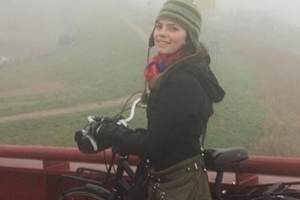 The Careers in Sustainability panel, hosted by the Gordon Career Center, the College of the Environment, and the Sustainability Office on October 4, 2019, included Nora Vogel ’11, director of communications for Coalition for Green Capital. The College of the Environment graduated its first cohort of environmental studies majors in 2010. Below, an interview with Vogel ’11, one of the first students to ever major in environmental studies at Wesleyan.
The Careers in Sustainability panel, hosted by the Gordon Career Center, the College of the Environment, and the Sustainability Office on October 4, 2019, included Nora Vogel ’11, director of communications for Coalition for Green Capital. The College of the Environment graduated its first cohort of environmental studies majors in 2010. Below, an interview with Vogel ’11, one of the first students to ever major in environmental studies at Wesleyan.
Did you come to Wesleyan knowing you wanted to study Environmental Studies? What led you to the COE?
Nora Vogel (NV): I knew I was interested in science and the environment, and I was thinking about doing biology. I actually worked in Professor Sonia Sultan’s lab, which was an amazing experience. At the same time, it felt hard to stick to research science as a career path, when I felt that many decision-makers in the world aren’t listening to the perfectly good science that we already have. That’s what got me interested in communications and in the Science in Society Program (SISP). I wondered what makes people make decisions about things, and what makes them trust one source and not another one. I took a Media in Society class that dovetailed really well with that, along with some sociology classes. I took a philosophy class with Professor Joseph Rouse about objectivity that I loved; we went deep down the rabbit hole of whether objective truth really exists. I still think about it all the time. The great thing about SISP was that it gave me a way to fit those things together, and it ended up being directly relevant to the career path I ended up on.
Read more


 Andrei Pinkus ‘21 is a communications and data support resource assistant at the US Forest Service. During his time at Wesleyan, Andrei was a recipient of a 2020 COE Summer Research Fellowship. He graduated with a BA in government and environmental studies.
Andrei Pinkus ‘21 is a communications and data support resource assistant at the US Forest Service. During his time at Wesleyan, Andrei was a recipient of a 2020 COE Summer Research Fellowship. He graduated with a BA in government and environmental studies. Rebecca Lopez-Anido ‘21 is a laboratory research assistant at the Scripps Institution of Oceanography. During her time at Wesleyan, Rebecca was a research assistant in the Chernoff Lab and a recipient of a 2020 COE Summer Research Fellowship. She graduated with a BA in biology and environmental studies.
Rebecca Lopez-Anido ‘21 is a laboratory research assistant at the Scripps Institution of Oceanography. During her time at Wesleyan, Rebecca was a research assistant in the Chernoff Lab and a recipient of a 2020 COE Summer Research Fellowship. She graduated with a BA in biology and environmental studies.
 Maggie O’Donnell ’19 is the research and program associate at The Climate Museum in New York City, where she coordinates new aspects of the Museum’s online presence including the Online High School Internship Program and the Climate Ambassador Card. Maggie was a religion and environmental studies major and art history minor at Wesleyan and a member of our 2018-19 COE Think Tank.
Maggie O’Donnell ’19 is the research and program associate at The Climate Museum in New York City, where she coordinates new aspects of the Museum’s online presence including the Online High School Internship Program and the Climate Ambassador Card. Maggie was a religion and environmental studies major and art history minor at Wesleyan and a member of our 2018-19 COE Think Tank. The Careers in Sustainability panel, hosted by the Gordon Career Center, the College of the Environment, and the Sustainability Office on October 4, 2019, included Nora Vogel ’11, director of communications for Coalition for Green Capital.
The Careers in Sustainability panel, hosted by the Gordon Career Center, the College of the Environment, and the Sustainability Office on October 4, 2019, included Nora Vogel ’11, director of communications for Coalition for Green Capital.